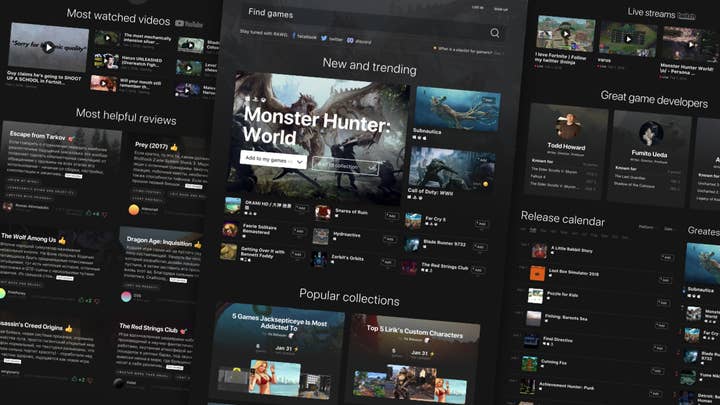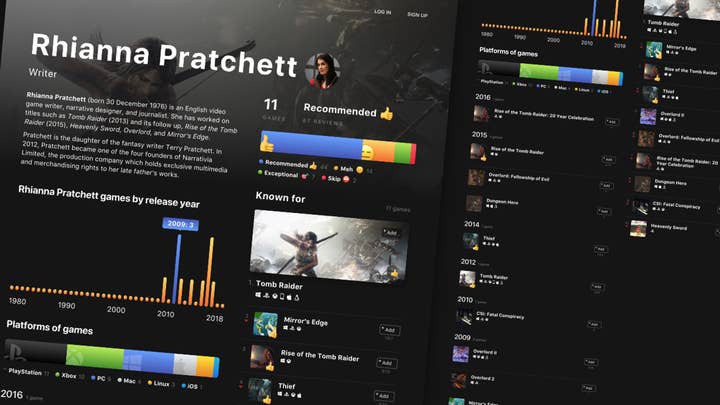Making RAWG the 'IMDB for games'
Dasha Lyalin explains how her team's new site will boost discoverability for developers across all platforms
Discoverability is perhaps the greatest issue facing all games developers and publishers in today's industry.
With more than 7,000 games releasing last year on Steam, exponentially more landing on mobile platforms, plus the hundreds of titles that arrive on console via both physical and digital stores, players are presented with an unprecedented amount of choice when it comes to their next purchase.
The media can filter through the noise as best they can, recommend only the highest quality titles while identifying those unworthy of players' time, but there are limits to how many games journalists can judge. Even influencers can't showcase every new release, so there will always be a seminal title, a hidden gem, that goes unnoticed.

RAWG believes it has the answer: an IMDB-style database of all video game releases (or as many as possible) that monitors what gamers have played and enjoyed, then recommends potential future purchases based on this data.
"Discoverability is a major problem that each platform tries to solve in its own way," COO Dasha Lyalin tells GamesIndustry.biz.
"Every platforms approach has its own tradeoffs and all of them behave as closed gardens that do not have any interest to recommend games outside of their markets - or games that will unlikely bring in lots of profit.
"We are not interested in what platform or store you choose, or whether you spend heaps of money on a game or play free ones - our main goal is to bring great content to your library and to redeem you from the agony of choosing."
Lyalin also argues that this means indies have as much chance of being discovered via RAWG as the AAA firms, adding that studios should "just make quality games, and we'll bring them to the right eyeballs."
"Discoverability is a major problem that each platform tries to solve in its own way. [But] all of them behave as closed gardens that do not recommend games outside of their markets - or games that are unlikely to bring in lots of profit"
Currently in beta, RAWG draws on the databases already established by Xbox, PlayStation and Steam - players simply enter their account ID for each platform, and their backlog is generated automatically. The site also covers mobile games, populating its listings from the App Store and Google Play. There is one fairly obvious omission, but it is currently beyond RAWG's power to rectify this.
"In order to support syncing with Nintendo we need some API and as far as we know right now Nintendo doesn't have one," Lyalin explains. "If the situation changes we'll react as soon as we can."
Nonetheless, countless Nintendo titles from all generations are listed on the site, with users able to state whether they have played or completed them as well as recommend them to friends.

Last month, RAWG secured €1m in seed round funding from Wargaming, Altair Capital and private investors such as Game Insight chairman Igor Matsanyuk, Zeptolab CEO Misha Lyalin and entrepreneur Pavel Roitberg. This will be instrumental in helping the site emerge from beta with its core feature - a personalied game recommendation system - within the first half of 2018.
"Our initial funding and the seed round will help us deliver the product roadmap planned so far: recommendations, the most comprehensive cross-platform game database, and UGC tools," says Lyalin. "This is what we plan to finish in a year. We will need lots of experiments, proofs of concepts, and so on to get the business model off the ground.
"Users' profiles on RAWG are libraries of all their games synced with their favorite platforms. This data is matched with games, and as a result we will make personal recommendations"
"Some hypotheses might need more fundings in the future, but we don't know it right now. So we will only start thinking about the next round in a year - or perhaps we won't need it altogether."
Since each platform holder has already established their own systems through which to catalogue your games collection and find new games through their digital stores, perhaps the biggest question is who RAWG is targeted at.
Lyalin believes the site's audience encompasses two demographics: the core gamers who play across multiple platforms and would like a single destination to reflect on the games they have played, and those who have trouble learning more about titles they have yet to pick up - or perhaps haven't even heard of.
Inspired by the likes of IMDB, its rival Letterboxd and even literary database Goodreads, Lyalin's team hopes to build "one platform to rule them all."
"Just make quality games, and we'll bring them to the right eyeballs"
Of course, this has been tried before with sites such as Grouvee and Backloggery. While these have their loyal audiences, it's safe to say they have yet to garner the mainstream attention IMDB has. While Lyalin is quick to stress she would not criticise previous attempts at bringing such a model to the games industry, she is confident RAWG has unique advantages.
Core to this is the personalised recommendations. The more information players add to their account - in terms of which games they completed, enjoyed and recommend - the more relevant RAWG's suggestions will be.
"We have just gathered enough data and started to work with it, but we have a strong position here," says Lyalin. "First, RAWG is a cross-platform games database. No matter the platform or release date, if a game is any good then we have it.
"We also take into account users' gaming background. Users' profiles on RAWG are libraries of all their games synced with their favorite platforms. This data is matched with games, and as a result we will make personal recommendations.
"Of course we track the feedback in a subtle way - if you dropped the game a day after you had started it, or if you left a negative review, then it means we have to revise our algorithm in this place and make it better."

However, the danger lies in simply recommending the obvious. If a user's profile is primarily composed of Call of Duty and Battlefield games, RAWG would presumably list other AAA shooters on the appropriate platforms but would it recommend indie efforts like Battalion 1944?
"It is a hard task to solve, but here we have more data than the others," Lyalin admits. "For instance, we can check non-typical data correlations - like what similar games indie lovers and AAA-lovers prefer on their mobiles. If they share tastes on a particular platform, the chances are they share similar tastes on another platform - they just don't know it yet. So there might be a great source of good recommendations. We will see."
"When it comes to games, most people have no idea who created games they love. It is only fair game creators will get the credit they deserve"
RAWG also syncs users' profiles with their various games accounts several times a day to ensure up-to-date information, as well as verifying that store information is also correct. There is also an editorial team adding new titles manually, and the company hopes that as the community grows, users themselves will help guarantee that no title is missed.
Lyalin is even hoping to get influencers involved, but until then a vital route of recommendation will be from friends. It can be argued that this will simply be an alternative to word of mouth, but Lyalin insists RAWG will offer something more permanent.
"Even when it comes from your best friends, word of mouth is easily forgotten," she says. "So you need a place where you can keep your backlog. Besides, friends do not always share similar tastes, and with RAWG you can check your compatibility score. If it is high enough, go for it. If this is low, well, just thank your mate for recommending that AAA bestseller and keep playing tiny indie beauties."
Interestingly, just as IMDB allows you to browse an actor or director's filmography, RAWG aims to better showcase the output of individuals as well as entire studios. Key personnel will even have their own pages to highlight their biggest hits.
"[When you look at] the amount of content there is - that is basically why we launched RAWG in the first place. We want people to invest their time, skills, and money into games they will love and to skip those they will dislike"
"When you are choosing a movie to watch in the evening, you don't make a choice on whether Paramount or 20th Century Fox or Warner Bros made it," Lyalin observes. "You think about who the director is or the actors are.
"When it comes to games, most people have no idea who created games they love. It is only fair game creators will get the credit they deserve."
Lyalin adds that simply browsing the output of an individual publisher, or even a single franchise, can offer titles that vary wildly in the quality and experience they offer.
"Assassin's Creed Rogue, Assassin's Creed Unity, and Assassin's Creed Syndicate were all released within 12 months, but developed by different teams in different parts of the world with different directors, writers, and so on," she says. "If you want to recommend people what to play, you have to know who made the games this person loved and hated before."
RAWG hopes to become the definitive database of quality video games, but that does not necessarily mean it will feature every single release. As mentioned before, thousands of new titles are published via Steam or the mobile stores every year, and with the barrier to entry for games development and self-publishing lowering all the time, this is only expected to rise.
"To include every game ever released in our database would be a vain dream, so right now we are focusing on adding quality content from all major platforms," Lyalin says. "However, we plan to deliver the feature to add games to our database manually, so if you find that there's no specific game, you will be able to add it easily.
"[When you look at] the amount of content there is - that is basically why we launched RAWG in the first place. We want people to invest their time, skills, and money into games they will love and to skip those they will dislike. This is what info services are for, isn't it?"
